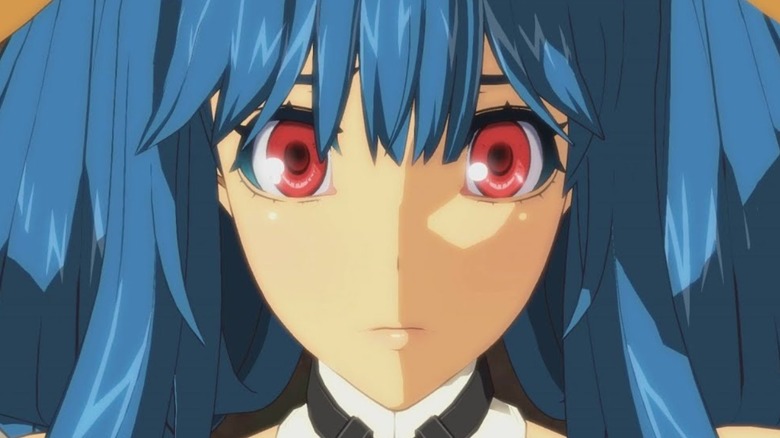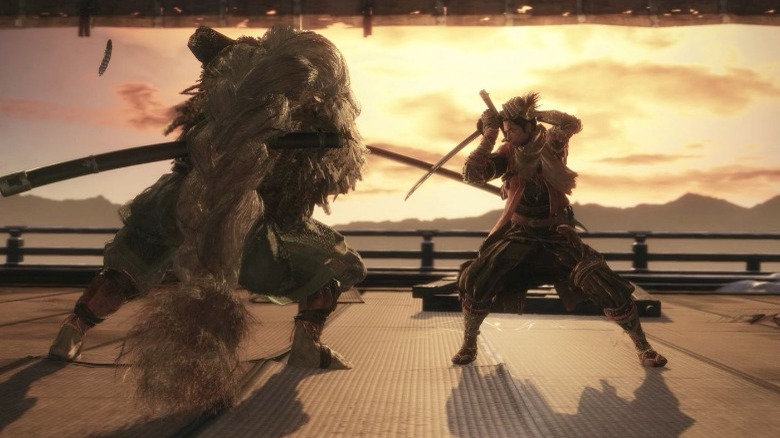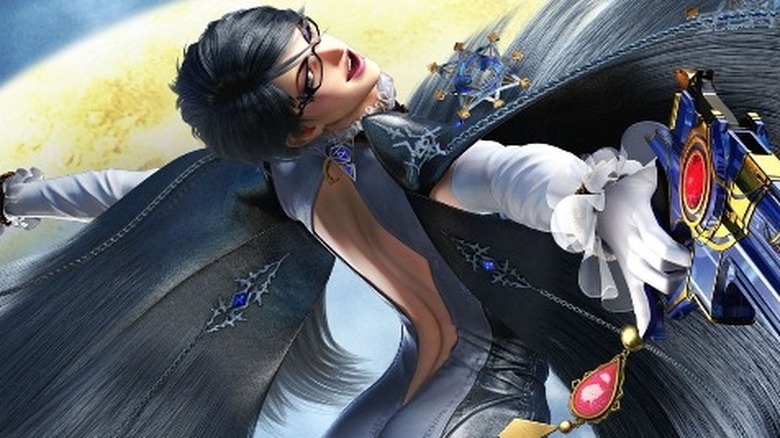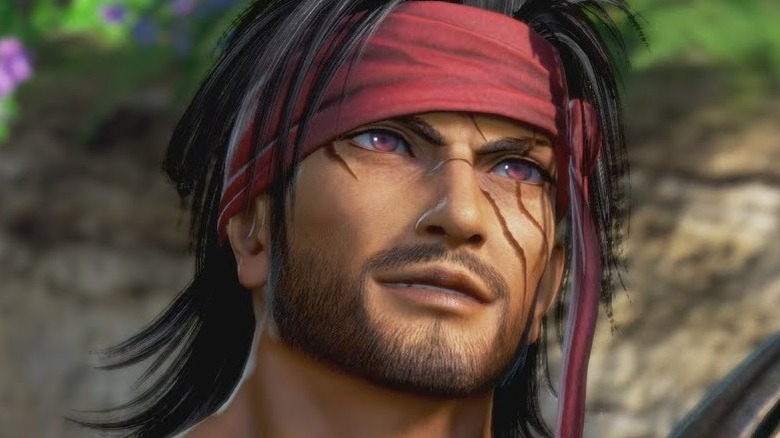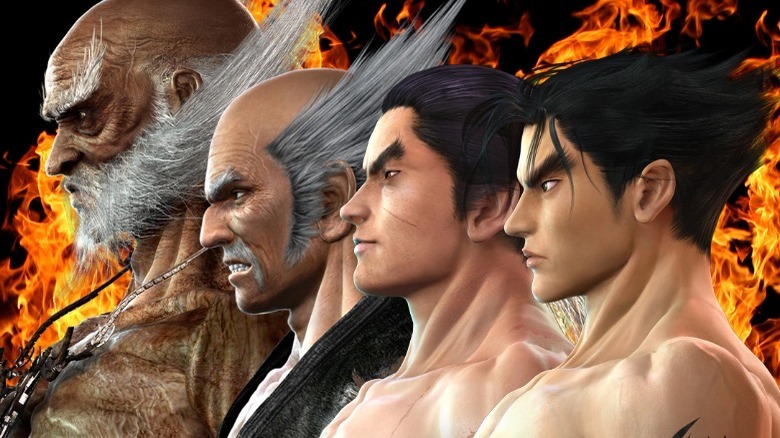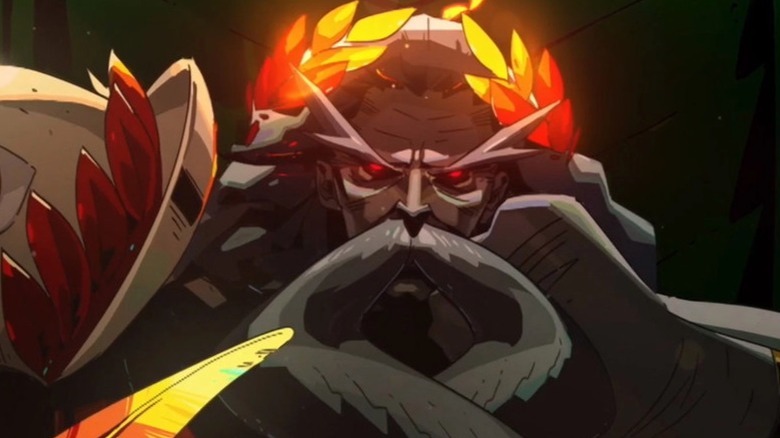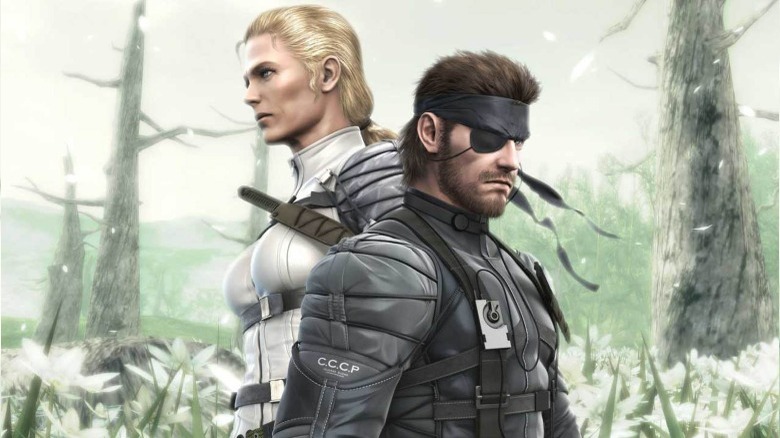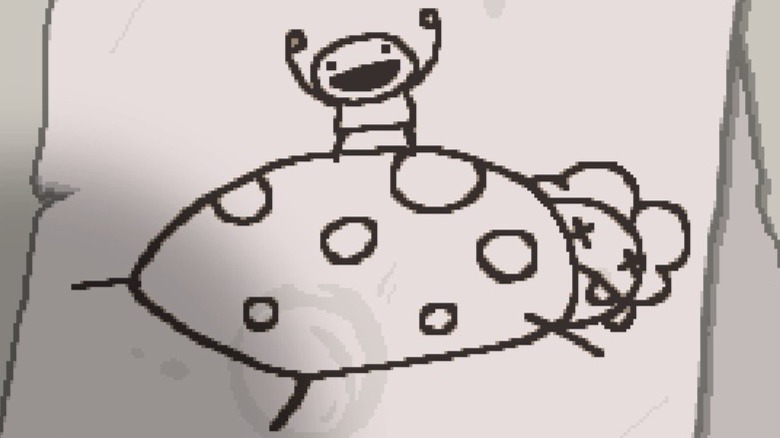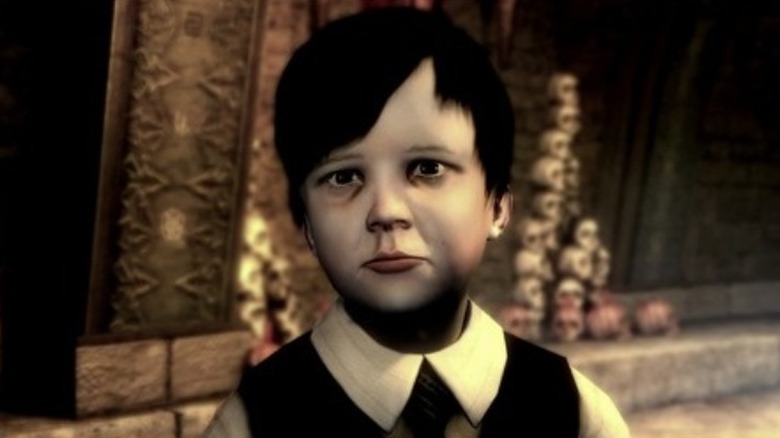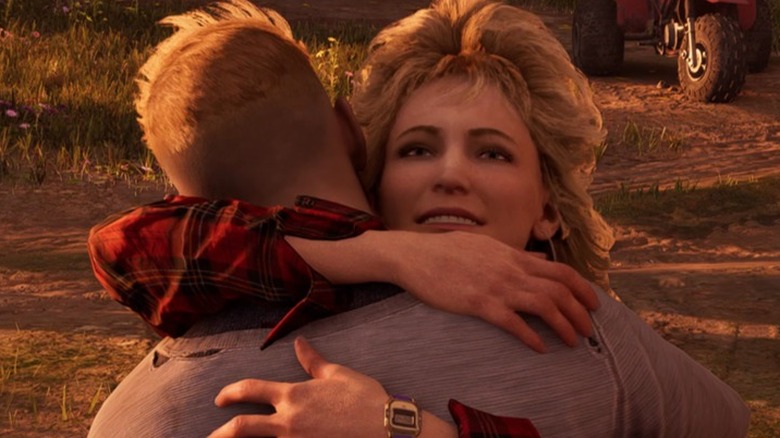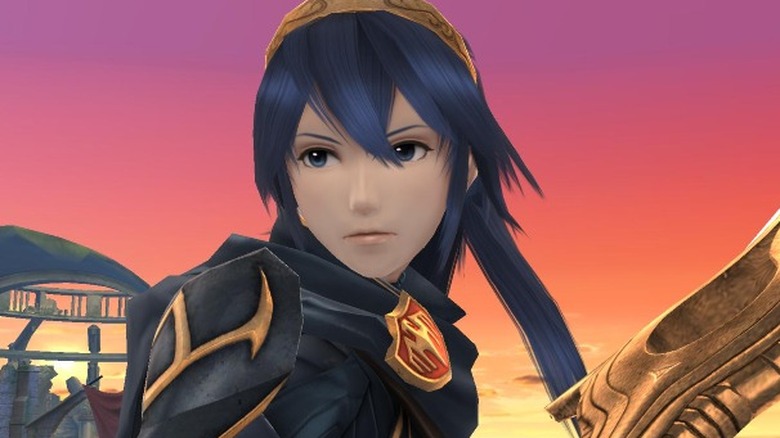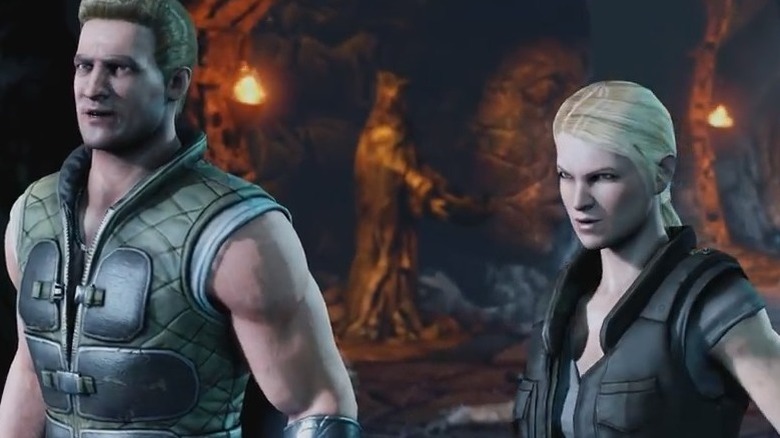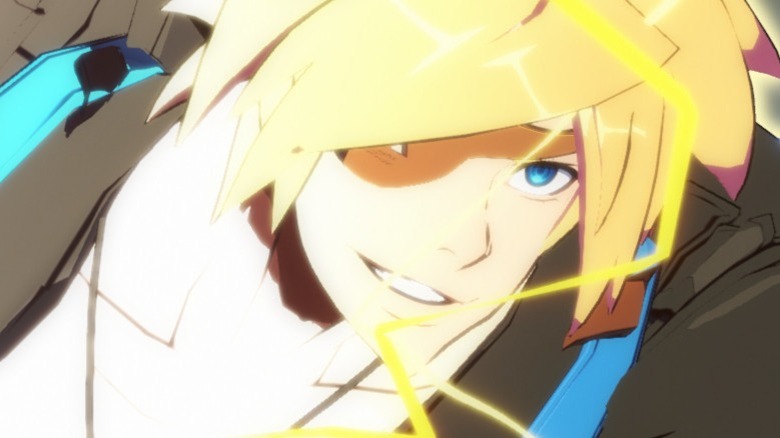Video Games That Let You Fight Your Parents
Sometimes, it's true that parents just don't understand. That said, it's socially unacceptable to fight one's parents, no matter how cruel they are — unless it's in a video game. Sometimes in games you just have to punch some parental figures.
The games on this list feature notorious parent-child battles, each of which has its own reasons for occurring. Some of the feuds are for fun or sport, but others are the result of complex plots and heartbreaking narrative turns. Really, you might want to avoid playing any of these games around your parents, just to be on the safe side. Wouldn't want them getting the wrong idea, after all.
Other times, kids go head to head with their parents because of unpredictable game glitches or unintended play, the result of players fiddling with games for years. Regardless of how it happens, here are just a few video games that let you fight your parents.
Sekiro: Shadows Die Twice
The Owl isn't technically Sekiro's father, but instead a foster parent. As VaatiVidya explained in his rundown of the story of "Sekiro," the Owl saw great potential in the "hungry Wolf" he found on the battlefield, and decided to take in Sekiro and train him in the ways of the sword. As Sekiro grows, he becomes skilled in swordplay as well, and he eventually – via his connection with the Owl – becomes the protector of the Divine Heir Kuro. For some time, Sekiro fulfills his duty, but eventually Owl returns to attempt and persuade his adoptive son to leave Kuro's side and instead join him. Owl invokes the Iron Code, which states that children must obey their parents above all else. Players, at that point, have a choice whether to join Owl or begin one of the most difficult boss battles of the game.
If Sekiro rejects his father, Owl pretends to accept the decision before striking Sekiro once his back is turned. Sekiro, of course, is ready, and fights back with style. However, the battle with Owl truly is a choice. Players can alternately choose to agree with their foster father and ally themselves with him – though that will eventually lead to one of the darkest endings of the game.
Gamers can also fight Owl at another point in the game – or rather, before it begins – by remembering the invasion of the Hirata Estate. Fighting this version of Owl is in some ways more difficult because he is younger and possesses more supernatural abilities. Even though this alternate fight with Owl is a memory accessed via a special item, it still has implications for the present plotline of the game.
Bayonetta
The story of "Bayonetta" is difficult to explain, at best. At worst, it's a fever dream of sexy witches, dancing, and powerful magic. After sleeping for hundreds of years, Bayonetta awakes with no memories of her past. Her father, Balder, eventually transformed from a well-intentioned Lumen Sage into a villainous tyrant, which means that Bayonetta must defeat him in battle.
The fight is truly epic, with Bayonetta and Balder posing and hurling magic across pieces of a crumbling building. Unlike many fights, this feud with Bayonetta's dad feels world-changing, even if it ultimately is only the prelude to the zaniness of "Bayonetta 2." How does the titular Umbra Witch take down her daddy? With a lipstick bullet, of course.
Because the "Bayonetta" series involves time travel, the second entry also sees Bayonetta cross paths with her parents. Unlike the first installment, she doesn't want to fight, however, and ultimately teams up with Balder to attempt to save her mother, Rosa.
Final Fantasy 10
The narrative of "Final Fantasy 10" is confusing, to say the least, but the heart of its story rings true for many people. The game has many characters, all with special relationships to each other, but much of the plot focuses on Tidus and Jecht, his father. Before the game even begins, Jecht discovers that he's from another world and fights to make sure his son is safe. Though Jecht ultimately transforms into a monster, he demonstrates love for his son. Of course, that son will ultimately grow up to fight him in a heartbreaking battle for everyone involved.
Knowing his father is trapped inside a monstrous being that could spell disaster for the world, Tidus has conflicting feelings about what he knows he must do. Tidus gets to talk to Jecht before they fight, seeing him for one last time in his human form. Though Tidus says he hates Jecht, there's emotion in his voice, and he clearly does not want to hurt his father. Jecht transforms into a gigantic beast, though he still retains his human face, and Tidus – along with his crew of friends – defeat Jecht once and for all, taking the evil Sin down with him. Before Jecht disappears completely, he returns to his human form and he and Tidus share a tender moment.
Tekken
The "Tekken" series is all about fighting, and even though it has a detailed, canonical plot, the real joy of the games is all about pitting powerful opponents against each other. The most fun part? Many of those fighters are directly related. One gamer described some of the cast as "a bunch of older men and they have problems in their family but instead of talking about their feelings they kick the s*** out of each other." Of course, this is in reference to the Mishima clan, a verifiable dynasty of warriors, each with their own agenda. From Jinpachi Mishima all the way down to Jin Kazama, players can craft epic family battles in the Mishima family, where children face off against their parents, grandparents, and cousins. It's a massive battle with enough bad blood to ignite the Devil Gene.
Oh, that's the other part of this family feud gamers should take note of. Many members of the Mishima clan have the Devil Gene, which not only grants them incredible strength but also – in some cases – an alternate devil form with superhuman abilities.
Hades
In Supergiant's surprise indie hit "Hades," which racked up numerous awards, the son of the Hades must repeatedly escape the underworld, all in the hopes of learning more about his mother, Persephone. While the premise is simple, the story of "Hades" runs deep, and a key part of that plot is Zagreus' relationship with his father.
Each time players make it to the end of the underworld, they must best Hades in order to proceed into the world of mortals. While many games would subject players to the same dialogue over and over with each fight, "Hades" beautifully weaves its narrative into dialogue before and after each final fight. As Zagreus continues to defeat his father, their relationship morphs, illustrating Hades' changing opinions on both his son and his former lover Persephone. In the case of "Hades," fighting your parents isn't the result of an awful feud, it's part of the journey to understanding oneself and becoming an individual.
Metal Gear Solid 3
Creative darling and game director Hideo Kojima worked on the "Metal Gear Solid" series until he messily split with Konami, but the games he created during that time stand as some of the most bizarre, iconic stories around. "Metal Gear Solid 3" proved that the series wasn't just about the threat of nuclear war – it was about family, too.
After suspecting that his mentor – aptly named The Boss – might be evil, Solid Snake is tasked with Operation Snake Eater, a grim mission to kill her. It's a job fraught with emotion, and players must grapple with their own feelings about destroying Snake's longtime friend and, in some ways, adoptive mother. The mission culminates with a cinematic fight in a field of flowers. In her final moments, The Boss gives Snake her gun and a piece of film containing important information, and he's hit with the realization that she wasn't on the bad side after all. After an emotionally charged pause, Snake mercifully shoots The Boss.
This fight is narratively significant to the game, more so than anyone could've predicted when "Metal Gear Solid 3" released. The Boss' legacy, and her desire to unite the world in a way not seen since before the Cold War, continue to be important in the games' plots. And of course, her influence on Snake, who becomes Big Boss after her death, remains central as well.
The Binding of Isaac
"The Binding of Isaac" is a wild journey that takes gamers through a horrifying series of procedurally generated levels, each with monsters formed from Isaac's own nightmares. A big part of that nightmare is his own mother, who has become obsessed with religion, eventually convincing herself that she needs to kill her own son, modeling herself after the story of Abraham and Isaac in the Bible. Though the pleasure of "The Binding of Isaac" comes from the repetitive roguelike gameplay, which offers players a multitude of abilities and perks each playthrough, the story rooted in Biblical imagery also weighs heavy on gamers.
Oh, and of course you get to fight your mom. It's unclear whether what's happening in "The Binding of Isaac" is real or a figment of Isaac's imagination, but Isaac must battle several iterations of his mother, including the bosses Mom, Mother, and Mom's Heart. Because the game could be in Isaac's head, players can fight Mom without fear of real world consequences for Isaac, but that doesn't mean the battle won't make you think. Some gamers have orchestrated theories that Isaac's mother isn't as much of a villain as she initially seems, arguing that she's actually calling out to save Isaac throughout the game, but the details are left up to player interpretation.
Lucius
Lucius isn't a protagonist gamers can really root for. The small demon-possessed boy seeks to do harm to pretty much everyone, including his family in this strange horror game titled after its main character. The entire premise of the game tasks players with slowly killing Lucius' entire family in order to repay a supposed debt his father owes to the Devil. One by one, Lucius takes out his family and the staff that works in their luxurious mansion. Eventually, Lucius must go up against his own parents, making a decision about how to handle his status as heir to the underworld.
While all that might sound like a deliciously fun time, reviews of "Lucius" weren't so favorable when it released in 2012. IGN's review of the game explained that it was potentially fun, but often frustrating. The game suffered from technical difficulties, like long loading times and glitchy objects. Overall, this experience might not be the parental fight gamers are looking for, but it offers a horror-themed spin on the premise.
Guardians of the Galaxy
The last thing that some characters want to do is fight their parents. One particularly heartwrenching game that allows players to fight their mother is "Marvel's Guardians of the Galaxy." In Chapter 8 of the game, Peter Quill, A.K.A Star-Lord, must make a brutal decision. After finding himself in a simulation created by The Matriarch, Peter is given everything he's ever yearned for: more time with his mother, who died tragically young, on their farm. However, something isn't quite right, and as he explores his former home, Peter realizes that he's trapped in a vision that isn't real.
YouTuber Woof Bandits shared the sad sequence, where Peter spends time with his mom and his friends on the farm, struggling to believe that his dreams have finally come true. His mother is warm and inviting, welcoming her son with open arms, which makes it all the more upsetting when Peter must shoot her in order to escape the Matriarch's simulation. The vision is immediately broken and The Matriarch is whisked away to safety.
Of course, "Marvel's Guardians of the Galaxy" is a game about choices, and players don't have to resist The Matriarch's vision. If they choose to accept the Promise, players will act out Peter's life on the farm with his mother and friends, having conversations, repairing a car, and just having a normal day. However, things seem off, and an ominous black border gradually consumes the screen, ending the game and offering players a chance to rethink their decision.
Super Smash Bros. Ultimate
All kinds of characters who would never meet in a canonical Nintendo game get to fight it out in "Super Smash Bros. Ultimate." That being said, one of the most interesting matchups is Chrom and Lucina, a father-daughter duo from the "Fire Emblem" series.
In the "Fire Emblem" timeline, Lucina is a time-traveling swordswoman, sent back in time to change the fate of the world. Her father, Chrom, has similar skills – as does their distant relative, Marth, who also appears in the "Smash Bros." series. Gamers can channel all of that sword-wielding energy into an epic family feud in any number of battles in "Super Smash Bros. Ultimate."
While some might assume that Lucina and Chrom share the same moves – especially since they both have similar stances – players argue that the pair is actually quite different. Lucina, for example, is more able to recover if knocked off a ledge, whereas Chrom will fall like a rock.
Mortal Kombat
The "Mortal Kombat" series has existed for so long that it's bound to have a couple of family members in its wide roster. It turns out that there's more than one set of children and parents in "Mortal Kombat." Gamers can choose to help the Cages duke it out or pit Jax and Jacqui against each other to get the family drama started.
"Mortal Kombat 11" even offers some special dialogue for parents and children about to face off. Johnny Cage and Cassie Cage share clever quips when they first meet in a match, with Johnny even accidentally calling his daughter "good lookin'" at one point. From their dialogue, it's clear that the two have a playful, adversarial relationship, and the fights between them will likely be just as charged.
Jax and Jacqui, on the other hand, seem to have an entirely different dynamic, and seem to be a bit warmer with each other in their intros. Jacqui tells Jax that he did the best he could when raising her, and Jax insinuates that he tried to keep Jacqui from coming to the competition in the first place. In general, Jax and Jacqui have a much more traditional father-daughter bond, but that doesn't mean that they can't throw down on the battlefield.
Guilty Gear
"Guilty Gear Strive" was one of the best fighting games of 2021, partially because of its wide cast of characters and lush animated visuals. However, the "Guilty Gear" timeline is nearly incomprehensible, partially because of its convoluted structure, and partially because of the massive amount of media included in the franchise.
Needless to say, there are a lot of family members who can fight each other in the "Guilty Gear" series, but many of them branch out from Sol Badguy, one of the most recognizable characters in the game. Sol's fiance, Aria, was – for reasons that are too complicated to explain succinctly – turned into a Gear named Justice. As a result of a battle between Sol and Justice (who Sol didn't realize was connected to Aria), Dizzy was born. From there, Dizzy grew up and married Ky Kiske, who she had a child with, Sin Kiske. Just by looking at this family tree alone, it's easy to see how convoluted some of the relationships in "Guilty Gear" are, and it's no surprise that some epic parent-child battles can happen as a result.
Unlike "Mortal Kombat," which often features specialized intros (especially in later entries like "Mortal Kombat 11"), the characters don't seem to have personal ways to antagonize each other in "Guilty Gear." Still, there are still some unbelievable opportunities to fight your parents in the series.

